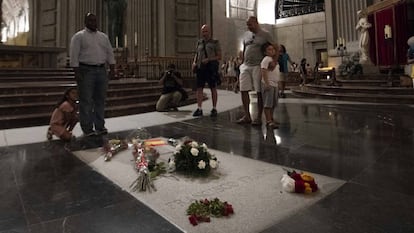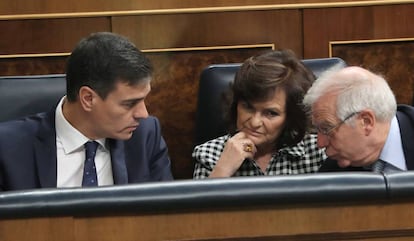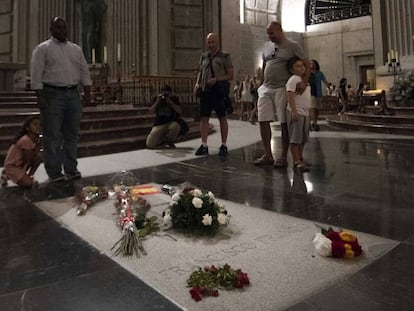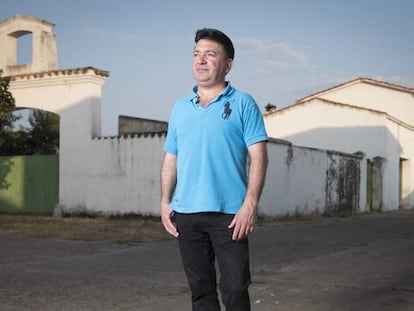Spain¡¯s deputy PM: Franco will not end up in La Almudena cathedral
After meeting with Vatican secretary of state on Monday, Carmen Calvo does U-turn and says government will ¡°use Historical Memory Law¡± to impede his transfer to central Madrid

The Spanish government has done a complete about-face on the issue of the exhumation of former dictator Francisco Franco, after the deputy prime minister, Carmen Calvo, met on Monday with the secretary of state for the Vatican, Pietro Parolin.
Having Franco reburied in the crypt at La Almudena would be disastrous for Prime Minister S¨¢nchez
Until now, the Socialist Party (PSOE) government of Prime Minister Pedro S¨¢nchez had said that it had no powers to stop the Franco family from having their grandfather reburied in La Almudena , a centrally located?cathedral that attracts thousands of tourists every year. Calvo has now said that the executive ¡°has mechanisms¡± to prevent the family from choosing the place of worship as Franco¡¯s final resting place.
The remains, the deputy prime minister has now said, would not be buried in the cathedral, adding that the Catholic Church and the government are looking for a way to ensure that they are taken elsewhere.
Swift reaction from the Vatican
In response to the deputy prime minister¡¯s comments on Tuesday, the Vatican was swift to react, and issued its own statement.
¡°With regard to the meeting that the secretary of state of the Holy See and the deputy prime minister of the Spanish government held on Monday, I would like to clarify the following,¡± said Greg Burke, the director of the Holy See¡¯s Press Office. ¡°Cardinal Pietro Parolin does not oppose the exhumation of Francisco Franco, if the competent authorities have decided to do that, but at no time did he make a statement about the place of burial.¡±
What¡¯s more, the Archbishopric of Madrid stated today that there have been no talks with the government over the burial of Franco or the desire of the family to lay him to rest in La Almudena. That was confirmed by three sources from the diocese on Tuesday to news agency Europa Press. The same sources insisted that the exhumation of the former dictator and his reburial are decisions that are the responsibility of the government and the family, and not the Church.
Pedro S¨¢nchez, who came to power in June after filing a successful vote of no confidence that ousted the Popular Party (PP) Prime Minister Mariano Rajoy, made the plan to exhume Franco from the Valley of the Fallen monument one of his star policies immediately after taking office. The initiative was rushed through Congress as a royal decree, and passed with the support of all parties, except the PP and center-right Ciudadanos, which abstained. The PSOE is in a minority government and therefore requires the support of other parties to pass laws.
The exhumation was green-lighted by Congress thanks to a change to the Historical Memory Law, legislation originally passed by the previous PSOE administration of Prime Minister Jos¨¦ Luis Rodr¨ªguez Zapatero, and aimed at closing the wounds left behind by the Spanish Civil War (1936-39) and the subsequent Franco dictatorship.
The Franco family are fiercely opposed to the plan to exhume the former dictator, and their idea of having him reburied in the crypt at La Almudena would be disastrous for S¨¢nchez, given that the dictator¡¯s remains would be moved from a location more than 50 kilometers from the center of Madrid, to the center of the city itself.
Calvo explained today that the government would be using that very Historical Memory Law to ensure that Franco does not end up in La Almudena. Until now, both S¨¢nchez and Calvo had stated that they would not be telling the Church where he could and couldn¡¯t be buried. ¡°We can do nothing else but respect the will of the family,¡± the deputy PM said on October 12. ¡°The burial is not within our control,¡± added government spokesperson Isabel Cela¨¢ last week.

But the reality was that the government was sounding out the Vatican and negotiating a solution. Calvo has now revealed the real situation, after yesterday confirming that the Catholic Church doesn¡¯t want Franco to go to La Almudena either. ¡°[The archbishop of Madrid] Cardinal Osoro said that he was not in favor [of him going to La Almudena], and we agreed [with the Vatican] to work together to find a solution that obviously does not include [La Almudena],¡± Calvo explained.
The two sides appear to be interested in finding a solution, but the Church has been calling on the government to facilitate things by finding a legal way to stop the burial from taking place at La Almudena. The government, meanwhile, has been calling on the Church to convince the Franco family to change its mind. In the end, some kind of compromise looks likely, whereby the Church will admit indirectly that it doesn¡¯t like the idea of Franco being reburied in La Almudena, and will hold some kind of talks with the family to try to convince them. The government, meanwhile, will take the initiative by making use of the Historical Memory Law, which precludes the glorification of Francoism.
The issue could end up in the courts, with the risks that this would involve
Despite all of this, the battle has only just begun, and everything depends on whether the Franco family ¨C whose space in the crypt already holds the remains of the dictator¡¯s daughter, Carmen Polo ¨C wants to see it through to the bitter end. If they decide to appeal against any administrative decision that would stop them from burying Franco in the cathedral, the issue will end up in the courts, with the risks that this would involve.
The S¨¢nchez government said that it had prepared for all scenarios before taking the initiative on the exhumation of Franco, but it now appears obvious that the family¡¯s decision to demand the reburial take place in La Almudena was not among them.
English version by Simon Hunter.
Tu suscripci¨®n se est¨¢ usando en otro dispositivo
?Quieres a?adir otro usuario a tu suscripci¨®n?
Si contin¨²as leyendo en este dispositivo, no se podr¨¢ leer en el otro.
FlechaTu suscripci¨®n se est¨¢ usando en otro dispositivo y solo puedes acceder a EL PA?S desde un dispositivo a la vez.
Si quieres compartir tu cuenta, cambia tu suscripci¨®n a la modalidad Premium, as¨ª podr¨¢s a?adir otro usuario. Cada uno acceder¨¢ con su propia cuenta de email, lo que os permitir¨¢ personalizar vuestra experiencia en EL PA?S.
?Tienes una suscripci¨®n de empresa? Accede aqu¨ª para contratar m¨¢s cuentas.
En el caso de no saber qui¨¦n est¨¢ usando tu cuenta, te recomendamos cambiar tu contrase?a aqu¨ª.
Si decides continuar compartiendo tu cuenta, este mensaje se mostrar¨¢ en tu dispositivo y en el de la otra persona que est¨¢ usando tu cuenta de forma indefinida, afectando a tu experiencia de lectura. Puedes consultar aqu¨ª los t¨¦rminos y condiciones de la suscripci¨®n digital.










































